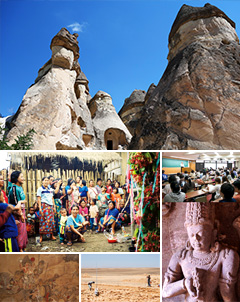Course of
Field Study of Cultures
This course, which newly integrates the three field research fields of comparative study of cultures, cultural anthropology, and study of cultural heritage, aims to understand the complexity of the substratum of cultures throughout the world across both spiritual and material aspects. This may be called a field of learning that explores the diversity and universality of human cultures from viewpoints going beyond space and time. Kanazawa University is the only university in Japan to offer such a course. By understanding different cultures, we reflect on how the world surrounding us has developed ways of seeing things that are different from what we had realized before.
Examples of Graduate Thesis Topics
- Aspects of Ivory from the Western Chou Dynasty to the Early Han Dynasty
- A Study of Ancient Roman Oval Arenas Based on the Ratio of the Major Axis to the Minor Axis
- Kanazawa "Maido-san" Sightseeing Volunteers ? Their Role in Kanazawa, City of Tourism
- Significance of the Establishment of the Kirin Lion Dance
- The Ideological Significance of the Salvation Theory of the Samkhya Sect
- A Study of the Altarpiece Style of Fra Angelico ? Focusing on the "San Marco Altarpiece"
| [Majors] | ê Field Study of Cultures |
|---|
Field Study of Cultures
oday, when societies are changing from one minute to the next, the state of learning is also greatly changing. It is difficult to fathom the diverse cultures that man has cultivated in every part of the world in every era over several million years using just the framework of previous disciplines. This Course on Field Studies of Cultures (the Field Studies of Cultures major) addresses all cultural phenomena, such as religion, ideology, occupations, technology, and the arts, to carry out a comprehensive interdisciplinary study of the multidimensional and multilayered organization of human cultures in every era in every part of the world.
The specialties of the faculty associated with this course cover a wide range of what, in conventional disciplines, would be called religious studies, the history of ideas, cultural anthropology, prehistory, archaeology, art history, or the study of cultural assets. Needless to say, you will delve deeply into these individual studies, but as the same time, you will endeavor to go past the framework of traditional disciplines by mutually stimulating close application.
The studies of this course start with first going out into the field to walk on your own feet, see with your own eyes, and feel with your own skin. Instead of following given data in a given manual, you will seek out your own questions, consider the methods for solving them, collect data painstakingly sparing no effort, organize these data logically, and draw a persuasive conclusion: The aim of our education is to cultivate such practical skills.


